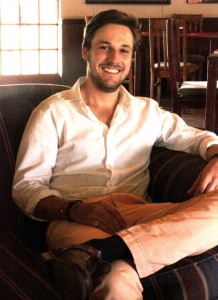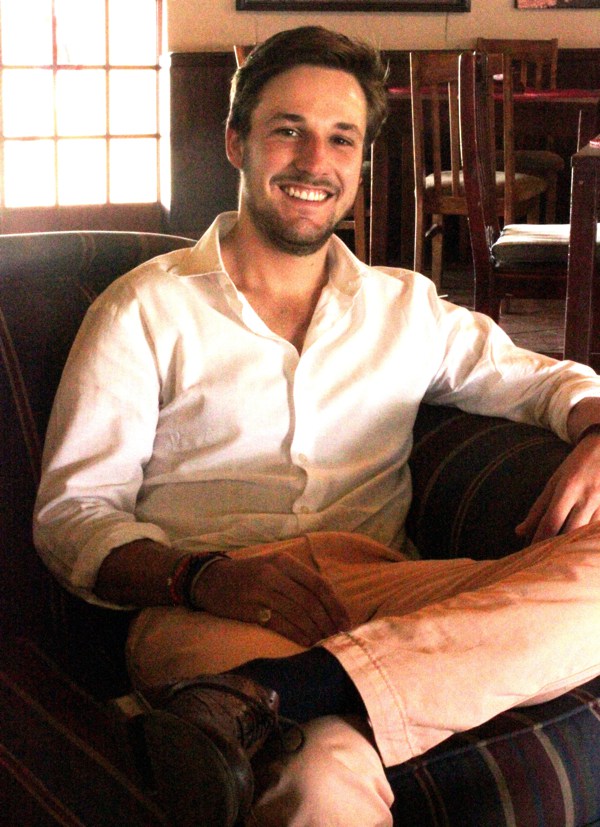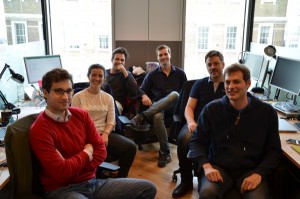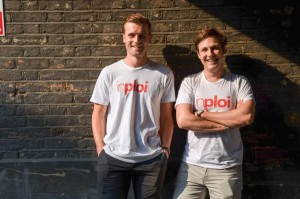Full name: Matthew de la Hey
Role: Co-founder & CEO
DOB: 11 October 1990
Birthplace: Pietermaritzburg, South Africa
Twitter Handle: @mattdlhey
Website: https://inploi.com/
Fun Fact: I’m uncle to 6 nieces!

So, let’s start at the beginning. You co-founded this thing with Alex Hanson-Smith, originally grew up in South Africa, studied at Oxford and have quite a history in entrepreneurship (with the Tuse app and InkuluFreeHeid etc) – could you tell us a little about your formative years, how you and Alex met, and where the original idea idea came from? What is the path that took you to today? Did you always want to start something?
I grew up in the countryside in KwaZulu-Natal, South Africa and studied Accountancy & Finance at Stellenbosch University. Whilst there, I was involved in setting up InkuluFreeHeid, a civil society organization getting young people involved in the political process and finding solutions to the country’s issues. I wrote the first professional examination to be a chartered accountant, but before I got stuck into being an article clerk won a scholarship to Oxford to read an MSc in African Studies.
I loved the university and applied again, winning a further year of funding to go on to do an MBA. During these years I did stints of work at the World Bank in Washington, an emerging markets hedge fund, and finally at an Africa-focused private equity fund. I’d always harboured entrepreneurial ambitions (probably out of a desire to write my own story, a gnawing restlessness, and an impatience to be able to influence the world), but it was during this internship that I decided that I was in the stage of life to go for it.
What’s the purpose of inploi, exactly? What problem in the industry are you guys looking to solve? We have lots of ‘industry’ readers so if you could tell them what inploi can do for them, that’d be splendid!
With inploi we’re bringing ‘recruitment’ out of the technological 90s and into the 21st century. Companies like Uber, Airbnb and Deliveroo have been hugely successful because they have, very effectively, made it possible for people with a need to connect with people who can satisfy that need. This is what we are building for the hospitality sector – a platform that allows employers to connect with jobseekers easily and efficiently.
Existing solutions – particularly jobs boards, agencies and some other ‘app-based’ companies are either expensive or really inefficient. At worst they’re both. We’re setting out to change that by building an employment marketplace, designed to fix many of the problems people face.
Jobseekers sign up to inploi and create a profile, which acts as a digital CV. This is what they use to apply for positions. Employers post jobs, for free, from either our smartphone app or web platform. These are then presented, via the apps, to job seekers who are suitable for the role. This ‘suitability’ is determined algorithmically, using things like past experience, skills required, the ratings that workers have received, location and their availability. .
Its really simple and easy, and much cheaper (both in terms of cost and time) than what people are using at the moment.
Some of our readers are in the startup space too – and you seem to have done particularly well in raising investment for inploi. Any tips that you can share? I remember an article you wrote for Medium about the ‘chicken and egg’ problem faced by ‘early stage’ startups.
Fundraising is a total nightmare. Everybody says that, but I don’t think one fully appreciates it until they’re living it. In our experience it takes longer than you intend and is harder (practically and emotionally) than you expect. We face the ‘chicken and the egg problem’ in building a marketplace business (we need both job seekers and employers to use inploi for it to be useful for either them – this is called a ‘chicken and egg’ problem), but to varying extents this is applicable to fundraising too.
Institutional investors (particularly in Europe) want to see meaningful ‘traction’ before getting involved – frequently this is difficult to achieve without funding. So in the early startup stages it’s a matter of hustling and doing things as cheaply as possible – calling in favours, relying on people’s goodwill, utilizing your savings, and doing high-impact free things. Friends, family, and people who know you are a good place to turn for funding at this stage as they’re more sympathetic and likely to believe in you.
However, getting involved with a start up is a seriously risky game (with huge upside potential too) so be really upfront and straightforward about things.
I think investors fundamentally want to see a few things: that the idea is novel, that you’ll be able to monetise it, that the market you seek to address is large (enough to make significant returns), that the team driving a project is committed and capable of executing on it; and that the company will be able to either disrupt incumbents, beat the competition, or, if applicable, create a new market.
Where do you get your ideas?
Despite the apparent chaos and uncertainty in the world around us: politically, economically, personally, for the most part things run according to a specific logic, which is generally determined by convention. Understanding that logic allows you to play according to it, to understand where it is deficient, or where you can influence it. Therein lies opportunity, and the source of some ideas I suppose.
I think a lot though, and ideas come in many shapes. I love being outdoors and am inspired by the peace of nature; I enjoy the company of interesting people, whose conversation teaches me about the world. I am stirred by the writing of others as a window into their lives.
What’s your philosophy, summed up in a sentence?
This may be a little abstract, but there’s an exchange in the 1986 film The Mission, after the Jesuit mission has been destroyed, which I find particularly poignant and relatable:
Hontar: “We must work in the world, your eminence. The world is thus.”
Altamirano: “No, Señor Hontar. Thus have we made the world…thus have I made it.”
What’s the biggest challenge you’ve had, how did you overcome it, and what did you learn from it?
On balance I’ve had a pretty easy life, but I have also faced a number of challenges. The adage “this too shall pass” is a good one to turn to to keep you going. Some challenges have taught me very practical things (which are not very interesting to read about) and others have given me insights into people – that we’re all human, complicated, frequently faking it, and often flawed. Empathy is paramount.
Who’s the person who’s most inspired you in your work – food industry or otherwise?
This is overused, but I admire what Elon Musk is doing tremendously. He is a visionary, and will likely change the course of human progress.
What do you enjoy most and least about what you do?
We’re building something from scratch – I enjoy the excitement of that, the freedom to create and experiment. We’re in direct contact with the impact of the work we do which is fulfilling. I suppose the flipside of that is that, at least in these early phases, is that we are surrounded by uncertainty and risk, and the team expects huge amounts of each other. That is a stressful place to be for months on end. But we have some amazing people working on inploi and we get through it all together.
What advice would you give to aspiring food/tech entrepreneurs who’d want the kind of results that you’ve had?
You are going to have to work incredibly hard. Harder than anyone you know. Perhaps one of the hardest parts is taking that first step into the void and setting out to build something. A key piece of advice, I’d say, would be to find yourself a good co-founder, whose skillset compliments your own and who will work as hard as you do. I think I’ve learned to be less hard on myself. We’ve made various boring mistakes along the way, and have failed at various things from sales meetings to investment discussions. Pick yourself up, dust yourself off, and get back in the saddle.
If you weren’t doing what you do now, what would you be doing instead?
Ha! I think it’s a pretty close race between two pretty opposite ends of the spectrum – I’d either be working in finance, or I’d be travelling the world’s less well trodden places in search of adventure (probably starting in Northern India or in Stone Town, Zanzibar – too of the most magical places on the planet), writing a novel or a travelogue. In the long run I am interested in getting into politics. Even more so after the seismic events of the last few months.
If you could get anyone to try the platform (fictional or real, living or dead) who would you pick? Assume that they go on to be your brand ambassador…
Heston Blumenthal. Chef and scientist, he knows the hospitality industry from the bottom-up (to a molecular level…), having worked in it from the age of 18. Being a tech-based product for the sector I think he would give us some interesting feedback. He has a motto to ‘question everything’, which is what we try to do at inploi to make the product better and better and give our users an increasingly good experience.
He’s also cool guy, well respected, and if we chucked him into an inploi tee-shirt he’d be an amazing ambassador!
![[Ed: they have bike seats. We don't really understand the significance...]](http://tastingbritain.com/wp-content/uploads/2016/11/TastingBritain.co_.uk-Matthew-De-La-Hay-Imploi-Interview07-300x300.jpg)
What’s your ultimate aim and goal for the business? If you could achieve anything with it, what would you pick? Money and reality are no obstacle, so shoot for the moon…
If we could achieve ANYTHING, inploi would be the global portal through which to find work or workers. You’d be able to use the platform throughout your career, in whatever industry you pick – from your first high school job through to something to keep you occupied when you retire. You’ll be able to travel the world, securing work ahead of arrival using inploi. Unemployment will be drastically reduced as the the labour market will be totally fluid, with greater access to information and opportunities.
Supply and demand will be much better matched. Wages will rise because the inefficiencies and middlemen will be removed. More jobs will be created because it’ll be easier to find people at short notice, and for short periods. It’ll be much easier to know what you should be paid.
Anything I missed that you’d like to include here?
As we’re getting off the ground, and you’re a cool publication, we’d love to have your readers onboard. If they signup at https://www.inploi.me and add the code “inploitasting16” we’ll send jobseekers an epic winter hat (and a bonus on getting a job), and employers couple of months’ use of the platform for free.
And we always ask three customary ridiculous questions…
If you could swap lives for the day with any fictional character (and you’d be guaranteed to return to your life after 24 hours), who would you choose, and why?
Tough question. Qui-Gon Jin from Star Wars. He’s pretty badass, a bit of a maverick, incredibly wise, and flies around the universe exploring interesting places.
If you had to become some kind of vegetable related superhero, which would you become, and what would you superpower be?
I’d be maizeman… With the power to raise corn from the ground. And of course to fly. I could then shoot around the world growing people food. Corn is super versatile so is probably a useful vegetable (it is a vegetable isn’t it?) to have.
You have acquired a pet T-Rex and are morally obliged to look after it. It is 13 ft tall at the hips, eats half a ton of raw meat a day, and likes taking long walks. What would you call it and what would you do to keep it entertained and housed?
He’s called Fenton. After some seriously tedious training he has become be very polite and well behaved. He sleeps in an enormous doghouse in the garden, although the snoring is horrific. Walking him down Oxford street causes quite a stir, but he no longer tries to eat people, thankfully.
Image credits:
Victoria Bushnell
Quomodo Limited (inploi)


